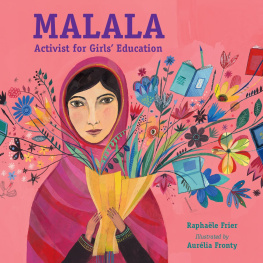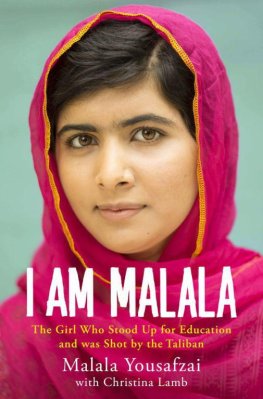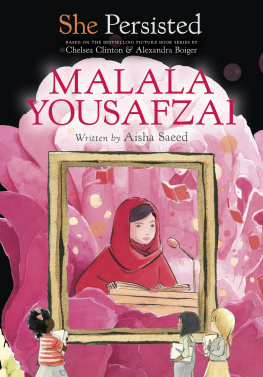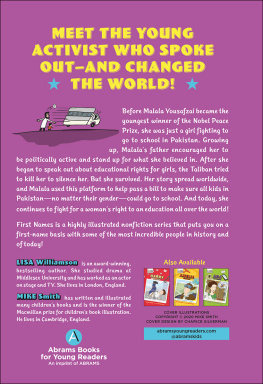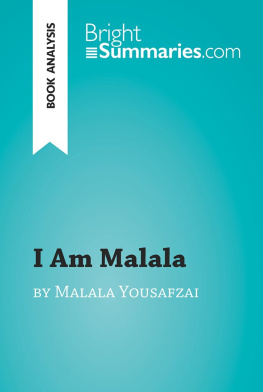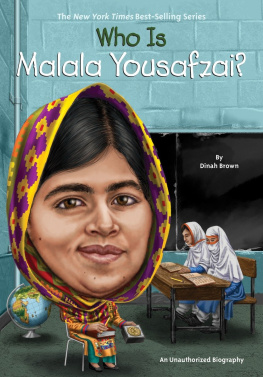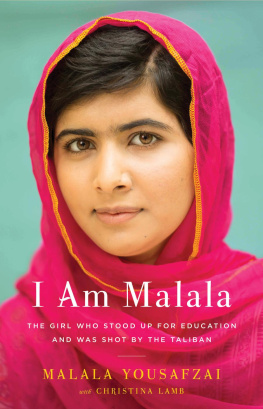2017 First US edition
Translation copyright
2017 by Charlesbridge Publishing. Translated by Julie Cormier.
All rights reserved, including the right of reproduction in whole or in part in any form.
Charlesbridge and colophon are registered trademarks of Charlesbridge Publishing, Inc.
Published by Charlesbridge
85 Main Street
Watertown, MA 02472
(617) 926-0329
www.charlesbridge.com
First published in France in 2015 by ditions Rue du monde,
5 rue de Port-Royal, 78960
Voisins-le-Bretonneux,
France, as Malala: pur le droit des filles lducation by Raphale
Frier and Aurlia Fronty. Copyright
2015 Rue du monde www.ruedumonde.fr
Library of Congress Cataloging-in-Publication Data
Names: Frier, Raphale, 1970 author. | Fronty, Aurlia, illustrator.
Title: Malala: activist for girls education/Raphale Frier; illustrated
by Aurlia Fronty.
Other titles: Malala. English
Description: 1st US edition. | Watertown, MA: Charlesbridge, 2017. |
Translation of: Malala: pour le droit des filles lducation.
Identifiers: LCCN 2016009136 (print) |
LCCN 2016020768 (ebook) |
ISBN 9781580897853 (reinforced for library use)
| ISBN 9781632895912 (ebook) |
ISBN 9781632895929 (ebook pdf)
Subjects: LCSH: Yousafzai, Malala, 1997Juvenile literature. |
GirlsEducationPakistanJuvenile literature. | Sex discrimination in
educationPakistanJuvenile literature. | Women social
reformersPakistanBiographyJuvenile literature. | Political
activistsPakistanBiographyJuvenile literature.
Classification: LCC LC2330 .F7513 2017 (print) | LCC LC2330 (ebook) | DDC
370.82095491dc23
LC record available at https://lccn.loc.gov/2016009136
Printed in China
(hc) 10 9 8 7 6 5 4 3 2 1
Display type set in ITC Officina Serif
Text type set in ITC Officina Serif and ITC Officina Sans
Printed by 1010 Printing International Limited in Huizhou, Guangdong, China
Production supervision by Brian G. Walker
Designed by Sarah Richards Taylor
Malala is born at dawn in 1997. She is
the first child of Ziauddin Yousafzai
and Tor Pekai. They live in the large
city of Mingora, which spreads out
across the depths of the Swat Valley
in Pakistan. Their home is across the
street from a school for girls that
Ziauddin foundedthe Khushal School.
Malalas father is not sorry that his
child is a girl, as some new fathers in
their country might be. Ziauddin is very
fond of his Pashtun people, but he is
not as fond of some of their traditions.
Ziauddin asks friends and family to
throw dried fruits, candies, and coins
into her cradle, as they would for a boy.
Malala grows up with the smell of
notebooks in the air. It doesnt take
long for her first little brother to
arrive. He is named Khushal,
like his fathers school.
The two children run together in the classrooms after
school is over, or play hide-and-seek with neighbors.
They fly kites on the rooftop and try to touch the sky.
Malala and Khushal look out at the city toward Mount
Elum, where the snow never melts.
Malala loves her grandfathers village, way
up in the mountains, far from the pollution
in Mingora. There, the water in the lakes and
waterfalls is pure, the nuts are abundant, and
the honey is delicious. In the winter, people
make snow bears.
But Malala does not love all the village
stories, like the one about Shahida, who
was sold to an old man for marriage. In the
Pashtun mountains, even more than in the
city, men are the ones who are visible in
society and the workplace, while women
stay at home and must obey the men. Most
women, like Malalas mother, cannot read
or write.
Malala likes to climb up on the roof at home in Mingora
so she can listen to the sounds of the city, the chatter
of the birds, and the words of her father talking about
politics with his friends while they drink cardamom tea.
They talk about how the Taliban, a powerful and
violent political group, has set another school on fire.
Malalas father and his friends hate that the Taliban
wants students to study strict, very conservative
interpretations of the Quran.
They call the Taliban an ignorant group and worry
that it will cause terrible problems.
Ziauddin often shares ideas with his daughter. Malala
knows that she is lucky to have thoughtful parents. Her
mother loves a Pashto song that goes like this:
Dont kill doves in the garden.
You kill one, and the others wont come.
Malala thinks about what this means.
A terrible earthquake shakes the region on
October 8, 2005. The mountain villages are
reduced to dust.
Soon afterward Malala realizes that her
father is worried about something else, too.
A man named Fazlullah, who is in charge of
the nearby Taliban, scares Ziauddin. Fazlullah
wants to close Ziauddins schoolhis school
for girls.
Fazlullah takes advantage of peoples
sadness about the earthquake. Time and time
again, through his local radio station, he tells
them that their sins caused the earthquake.
He tells them to stop listening to music and
watching movies. He says this will make
everything better.
Malalas father is heartbroken. He rejects
the use of religion to threaten freedom.
But people worry: What if Fazlullah is telling the truth?
Fear settles in the valley. Some people throw their televisions,
computers, CDs, and other belongings into fires.
But the Taliban insists that even more needs to be done.
People stop dancing. Beauty parlors close. Men stop
shaving because the Taliban requires that beards are
worn. Womens bodies and faces are covered by burqas
long cloth garments that flow from head to toe. The
Taliban is on patrol. Taliban members arrest people who
disobey them and whip or kill people if they
resist the new rules. Ziauddin is afraid,
but he dares to disagree. He allows
Malala to speak out against the
Taliban in a September 2008
speech covered by newspapers
and television stations. There
she asks, How dare the
Taliban take away my basic
right to education? She is only
eleven years old.
As 2008 ends, the Taliban
announces another ban: girls no
longer have the right to go to
school as of January 15, 2009.
How can they stop us from going to
school? Malala is upset.
Her friends are angry, too. They have
already blown up hundreds of schools, and
no one has done anything.
Then an opportunity arrives.
Malala is recruited to write about
girls and education. Her first blog
post, written under the pseudonym
Gul Makai, appears on the British
Broadcasting Corporations website.
DIARY OF A PAKISTANI SCHOOLGIRL
Saturday, January 3, 2009
I Am Afraid
I had a terrible dream yesterday with military helicopters
and the Taliban....
Malalas words do not stop the Taliban. The group goes
farther north and uses even more violence.
Soon there are peace agreements between the
Pakistani government and the Taliban. But the
agreements dont work in the end. The Taliban
continues to use violence against the people.
Then tanks and guns arrive in the valley.
It is war.
Malala and her family abandon their house and
travel to the village where her grandparents live.
They stay in four cities over three months before

